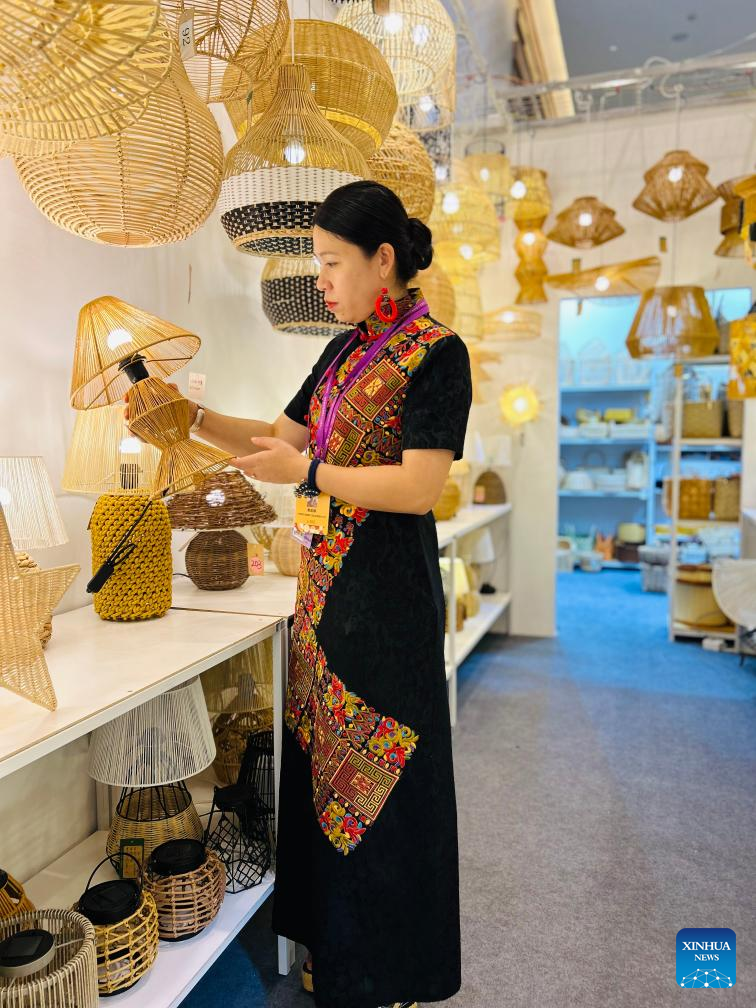
Huang Lianjiang, general manager of Bobai Huangtu Arts and Crafts Co., Ltd, checks a rattan product in Bobai County of Yulin City, south China's Guangxi Zhuang Autonomous Region, March 27, 2024.(Xinhua)
NANNING, April 1 (Xinhua) -- In a factory in Bobai County of Yulin City, south China's Guangxi Zhuang Autonomous Region, skilled craftsmen began their day's work early in the morning, weaving intricate lamp decorations and tableware from rattan and bamboo strips, for mounting foreign orders.
Renowned for weaving crafts, with roots tracing back about a millennium, Bobai has emerged as Guangxi's primary export hub for these artisanal products.
"I witnessed Bobai's products shipped across the ocean from Guangxi to Brazil, which was rather unexpected yet inspiring for me," said Huang Lianjiang, general manager of Bobai Huangtu Arts and Crafts Co., Ltd, adding that the products of her company have already been sold to over 20 countries and regions.
In 2018, Huang's company reached a deal with a Brazilian company through Alibaba, a Chinese cross-border trade platform. Since then, the trade volume has steadily surged from about 100,000 yuan (about 14,096.82 U.S. dollars) to more than a million yuan.
"Brazil has consistently been a robust partner for us, especially with products like lampshades enjoying significant popularity," said Huang. "During last year's Canton Fair, several Brazilian guests visited our booth and showed keen interest in the products."
To further solidify ties with overseas clients, Huang has made efforts to scale up production and enhance standards in alignment with customer preferences.
Meanwhile, Huang's company has set up a live-streaming group to promote their products on e-commerce and social media platforms, using English, Portuguese and other languages.
"We've been conducting live-streaming sessions from time to time since 2022. I sometimes communicate with customers in Portuguese, introducing our products to them," said Liu Baiyou, the company's foreign trade manager.
The company also expedited the process of introducing new products to the market to stay abreast of evolving consumer trends. Last year, a new design of breadbasket, boasting a 21-cm diameter, unexpectedly surged in popularity overseas, prompting the company to mobilize workers for overtime shifts to meet the demand.
In the past year alone, this particular product garnered over 3,000 online orders primarily from European and American countries, generating an output value of 12 million yuan.
This year marks the 50th anniversary of the establishment of diplomatic relations between China and Brazil. China has been Brazil's largest trading partner, export market and source of trade surplus for 15 consecutive years. Brazil is also China's largest trading partner in Latin America.
"Rattan crafts serve as a carrier of culture as well. We hope to use them to introduce Chinese culture to more people in Latin America," said Huang.
"The strong bilateral relations form the cornerstone for further collaboration between us and Brazilian companies. Our next goal is to deepen our connections with the Brazilian market and extend our business footprint to more Latin American markets," added Huang. ■



